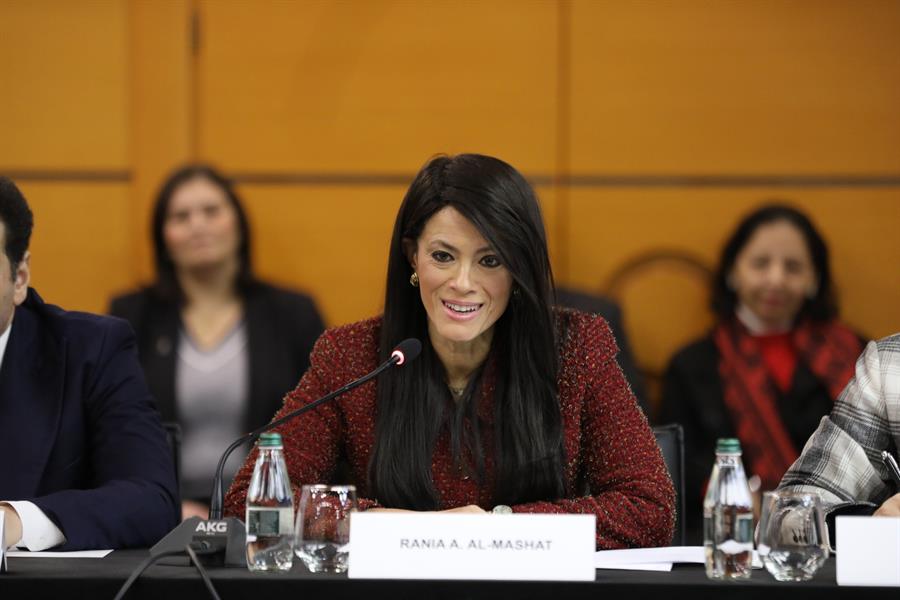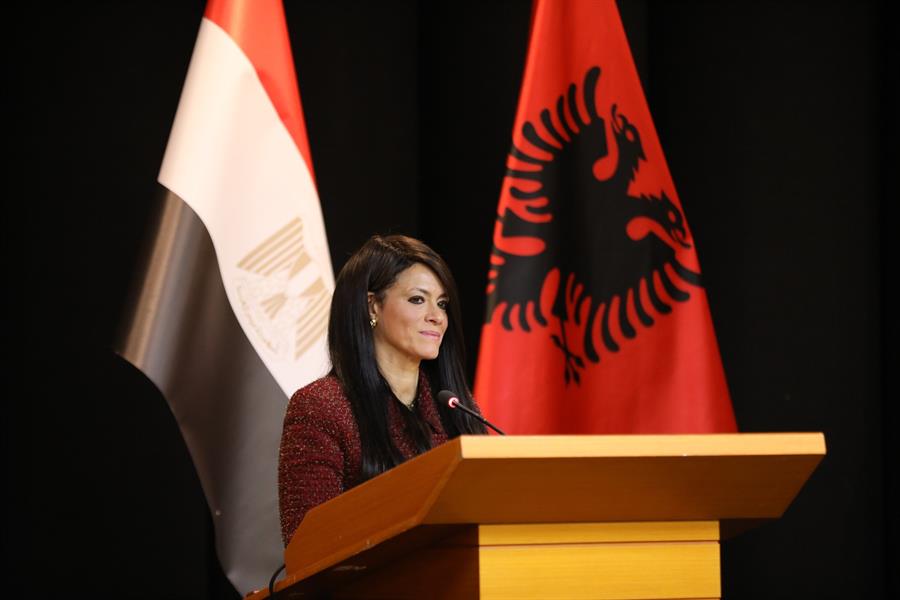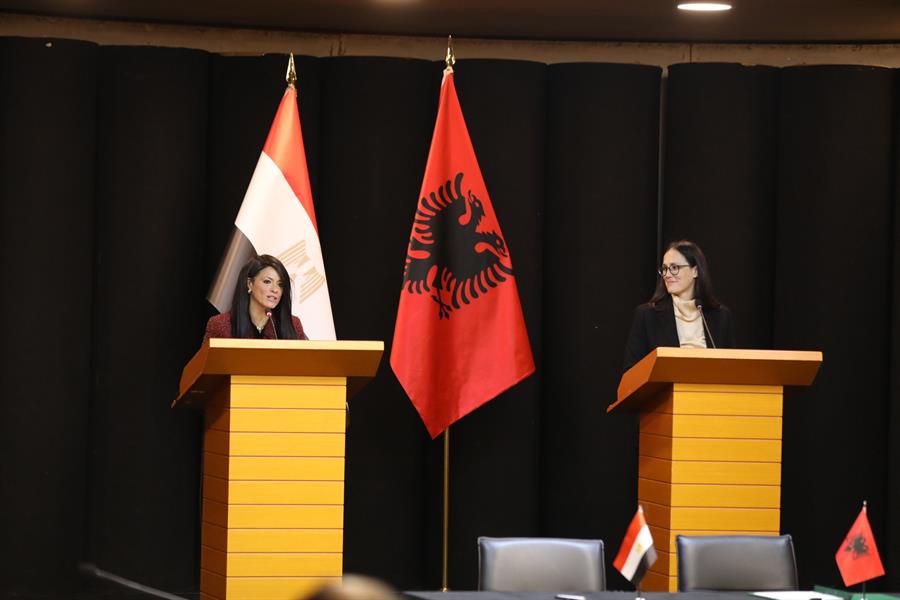Decent Life initiative works towards achieving the 17 SDGs: Minister of Planning and Economic Development

07 July 2021
Egypt’s Ministry of Planning and Economic Development held on Wednesday a press conference headed by Dr. Hala El-Said, Minister of Planning to announce the details of the ministry’s success in including four additional Egyptian initiatives on the “Best Practices” that achieve the UN goals for sustainable development” platform of the United Nations Department of Economic and Social Affairs.The listed projects were the presidential initiative, The Decent Life (Hayah Karima), the Rowad 2030 project, the local development program in Upper Egypt, and the integrated system for preparing and following up the investment plan.
During her speech, El-Said stressed the ministry's serious keenness and continuous efforts to ensure the consistency of the projects and initiatives it launched with the sustainable development goals.
El-Said explained that the ministry's success for the second time in including four major projects and initiatives within the United Nations platforms is an indication of Egypt's progress on the path towards implementing the UN Sustainable Development Goals, and the national version of them, represented in the "Egypt Vision 2030".
El-Said pointed to the importance of the electronic platform launched by the Department of Sustainable Development Goals of the United Nations Department of Economic and Social Affairs (UNDESA), in light of the acquisition by countries and international and regional organizations of a lot of experience in the field of achieving sustainable development goals since the adoption of the "UN Agenda 2030" in 2015.
El-Said also talked about the role of the sustainable development unit in the ministry is studying the electronic platform and identifying the nature of the projects and initiatives that were approved during the first call, as well as the nomination of a group of Egyptian projects and initiatives that meet the platform standards and highlight the efforts of the Egyptian government in achieving sustainable development, especially efforts targeting groups those most in need, and those that have achieved tangible results on the ground and positively affected the lives of citizens.
El-Said also confirmed that the projects and initiatives were chosen by the United Nations based on several objective considerations, the most important of which is that each initiative serves one or more of the UN goals, and that good practices be clearly defined and measurable, as well as focusing on ensuring that these practices ensure participation of various stakeholders or the formation of partnerships (local - regional - international), in addition to the practice of having monitoring mechanisms to ensure accountability and sustainability.
El-Said added that the design of these Egyptian projects and initiatives was based on a continuous transparent dialogue with various local and international development partners, confirming and enhancing the participatory approach adopted by the government in its efforts to achieve comprehensive and sustainable development in various sectors.
El-Said reviewed the most prominent features of the four initiatives and projects included in the United Nations platforms, which represent the ingredients for success, referring to the "Decent Life" initiative, the first phase of which was launched in January 2019, as part of the state's efforts to continue efforts to provide the necessary investments to improve the quality of life for citizens. She explained that the initiative achieves the 17 UN goals and targeted 375 villages, and contributed to reducing poverty rates in some villages by 11 percentage points, and resulted in an improvement in the rate of access to basic services by about 50 percentage points in some villages, as well as its contribution to alleviating the effects of the pandemic.
El-Said continued, explaining the success of the "Decent Life" initiative in reducing poverty rates and providing services in the villages covered by the initiative, which contributed to its inclusion on the electronic platform of the United Nations Department of Economic and Social Affairs (UNDESA) among the best international practices in achieving the UN Sustainable Development Goals (SDGs), explaining that this is because it converges with many of the UN Sustainable Development Goals, is specific, verifiable, has a time scale, and is measurable.
El-Said also referred to the launch of the second phase of the initiative within the framework of the "National Project for the Development of the Egyptian Rural", to target all villages in the Egyptian countryside with 4,584 villages in which more than half of Egypt's population - 50 million citizens, live, and at a total cost of more than EGP 700 billion, which enhances the efforts of the state.
On the integrated system for preparing and following up the investment plan, El-Said explained that the system for the first time the government owns such a system, which began in 2018 and represents an integrated electronic system that connects the general government units entrusted with preparing and following up on national, sectoral, and spatial plans in light of the sustainable development goals and " Egypt Vision 2030".
El-Said pointed to the role of the system in enabling Ministry of Planning employees to easily retrieve information and reports on projects for each assignee from the database, as well as its role in developing the follow-up and evaluation process for investment projects.
Concerning the local development program in Upper Egypt, El-Said explained that the Egyptian government launched it in cooperation with the World Bank in 2017 and the Ministry of Local Development, within the framework of the sustainable development strategy "Egypt Vision 2030", to meet the varying levels of growth, address development gaps and ensure the availability of basic services in the regions.
El-Said stressed the role of the Ministry of Planning and Economic Development, in cooperation with the Ministries of Finance and Local Development, in formulating a financing equation that contributes to direct investments to the governorates according to their development needs, and that the generalization of these practices to all governorates as of the fiscal year 2019/2020 has led to the mobilization of resources with an increase of $ 340% was directed to the governorates most in need, in line with the tenth goal of the UN Sustainable Development Goals: Reducing inequalities.
El-Said indicated that the program’s contribution to reducing poverty rates by 1.06% and 3.79% in urban and rural areas in Upper Egypt, respectively, compared to the levels recorded in 2017/2018, in line with the first goal of the United Nations Sustainable Development Goals: poverty eradication.
El-Said talked about the “Rowad” "Pioneers 2030" project, explaining that the Ministry of Planning launched the "Pioneers 2030" project as confirmation of the importance of spreading the culture of entrepreneurship and the idea of self-employment among young people, who represent the largest segment of society.
El-Said noted that cooperation protocols were signed with the universities of Cambridge, Cairo, the American University in Cairo, and the German University in Cairo, and the Leadership Development Center, 340 young men, and women benefited from master’s studies and various scholarships in entrepreneurship.
El-Said explained that this came with the aim of building and developing their capabilities and skills to enable them to transform their ideas into projects and take advantage of their energies to contribute to supporting economic growth and creating job opportunities, in addition to establishing 10 business incubators in the fields of artificial intelligence, tourism, and others, as well as launching a training program to raise the efficiency of managers Incubators, according to international principles and standards, in cooperation with the American University in Cairo (AUC).
"The success of including these initiatives proves that the Egyptian state, in very exceptional circumstances, can prove to the whole world that it can achieve all these achievements in an accelerated manner," El-Said concluded.









